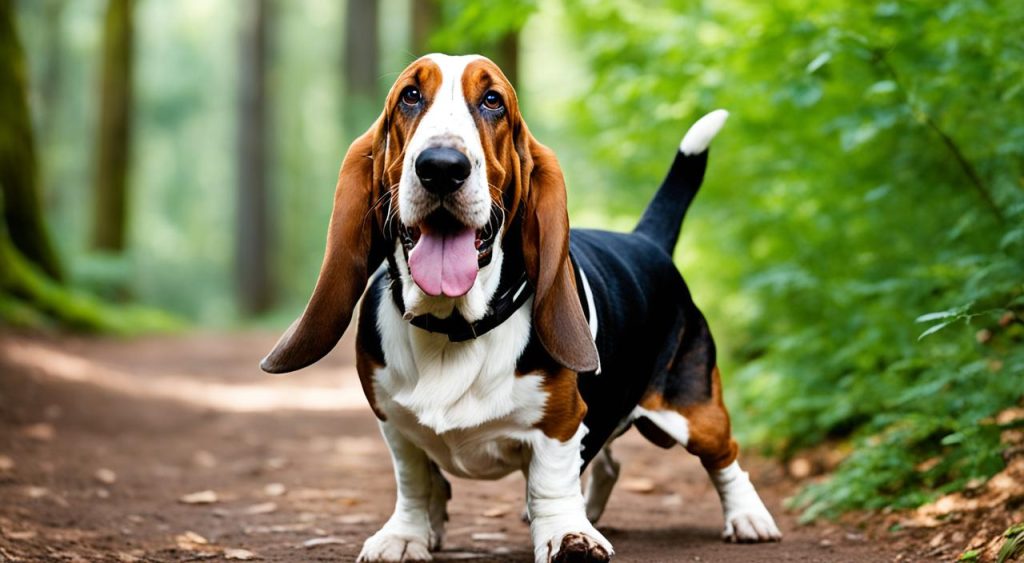When it comes to training a Basset Hound, their independent nature can make it a bit more challenging compared to other dog breeds. Basset Hounds have a history as scent hounds, bred to follow scents without constant guidance from humans. This independent streak means they may not be as eager to please their owners as some other breeds. However, with patience, time, and persistence, it is definitely possible to train a Basset Hound. Consistency is key, and it’s important to work at a pace that suits their individual needs. With the right training methods and approach, you can have a well-behaved and obedient Basset Hound by your side.
Key Takeaways:
- Training a Basset Hound can be more challenging due to their independent nature.
- Patience, time, and persistence are necessary for successful training.
- Consistency is key in training a Basset Hound.
- Understanding their behaviors and instincts is crucial in tailoring training methods.
- Positive reinforcement is an effective training technique for Basset Hounds.
Understanding the Behavior of Basset Hounds
Basset Hounds have an independent and stubborn nature due to their history as scent hounds. They were bred to follow scents persistently without distraction from their handlers. This one-track mind can make them more challenging to train compared to breeds that are eager to please.
Basset Hounds may seem aloof and not as concerned with pleasing their owners, but this doesn’t mean they can’t be trained. Their independent nature requires owners to work closely with them and provide patient and consistent training.
Understanding their instincts and behaviors can help owners tailor their training methods to better suit the needs of Basset Hounds.
Encouraging and Effective Training Techniques
Socialization plays a vital role in training Basset Hounds, enabling them to interact positively with unfamiliar dogs and people. It helps them develop good manners and prevents behavioral issues. By exposing your Basset Hound to various sights, sounds, and experiences, you can help them become more comfortable in different situations.
Basic obedience training is another essential aspect of Basset Hound training. It teaches them to respond to voice commands reliably. Start with simple commands like “sit,” “stay,” and “come.” Gradually increase difficulty and incorporate more advanced commands. Consistency and patience are key during this process, as Basset Hounds may take longer to learn and respond to commands compared to other breeds.
House training is crucial for teaching your Basset Hound proper elimination habits. Establish a routine by taking them outside regularly and praising them when they relieve themselves in the appropriate area. Keep in mind that accidents may happen, and it’s essential to remain patient and avoid punishment.
Leash training is an important skill to teach your Basset Hound to walk calmly by your side. Use positive reinforcement techniques like treats or praise to reward them for walking without pulling. Start with short walks in familiar environments, gradually introducing more distractions and longer walks. Consistency and patience are key to success in leash training.
“Positive reinforcement is an incredibly effective training technique for Basset Hounds. It involves rewarding desired behaviors rather than punishing unwanted ones. Use treats, praise, or play as rewards to keep your Basset Hound engaged and interested during training sessions.”
Short and fun training sessions work best for Basset Hounds, as their attention span may be shorter compared to other breeds. Keep the training sessions engaging and varied to maintain their focus and enthusiasm. Remember to end on a positive note to leave your Basset Hound feeling accomplished and excited for the next training session.
Understanding Basset Hound Characteristics
Basset Hounds are unique medium to large-sized dogs known for their distinctive low height. Despite their short stature, they typically weigh between 40 and 60 pounds, giving them a sturdy and solid build. Their coat is dense and comes in a variety of colors, ranging from tri-color combinations of black, white, and tan to lemon and white or red and white.
Aside from their physical attributes, Basset Hounds are renowned for their friendly and easygoing nature. They are sociable dogs that often get along well with other dogs and pets, making them excellent companions for multi-pet households. Their people-oriented nature also extends to their interactions with children, as they tend to be patient and gentle.
“Basset Hounds are known for their friendly and easygoing nature, making them good with other dogs and pets. They are people-oriented and get along well with children.”
However, it’s worth noting that Basset Hounds can be serious barkers and diggers. Their baying howls and tendency to dig up the yard are natural behaviors deeply rooted in their scent hound instincts. With proper training and redirection, these behaviors can be managed and minimized.
When it comes to intelligence, Basset Hounds possess a moderate level of smarts, but their stubborn streak can sometimes make training more challenging. It is important to approach training with firmness, patience, and creativity to keep them engaged and motivated. With the right training techniques and a consistent approach, Basset Hounds can overcome their stubbornness and thrive in obedience and agility.
“Basset Hounds are fairly smart but can be stubborn, which may make training more challenging. It’s important to approach training with firmness, patience, and creativity to bring out the best in them.”
In conclusion, Basset Hounds exhibit unique characteristics that contribute to their charm and individuality. Their low height, moderate weight range, coat colors, friendly temperament, and moderate intelligence make them a beloved breed for many pet owners. While they may present certain challenges in training, the rewards of having a well-behaved and loyal Basset Hound companion are immeasurable.
Tips for Successful Basset Hound Training
In order to successfully train your Basset Hound, there are a few key tips to keep in mind.
Proper Feeding and Exercise
Proper feeding is crucial for Basset Hounds to maintain a healthy weight and prevent back problems. Be sure to provide them with a balanced diet and monitor their food intake to prevent obesity. Additionally, regular exercise, such as a daily walk, is essential to keep them fit and prevent any excess weight gain.
Company and Socialization
Basset Hounds thrive in the company of their families and require plenty of attention and socialization. Spend quality time with your Basset Hound, provide them with companionship, and include them in family activities. Socialization with other dogs and people is also important to prevent behavioral issues. Introduce your Basset Hound to different environments, new experiences, and various social situations to help them become well-rounded and confident.
Handling Drooling and Barking
Drooling and barking are common traits of Basset Hounds. To handle excessive drooling, keep a towel or bib handy to wipe their mouth periodically. For barking, it’s important to address the root cause of the barking behavior, such as boredom or anxiety. Redirect their attention, provide mental and physical stimulation, and consider professional training or behavior modification techniques if needed.
Remember, consistent and patient training is key when it comes to Basset Hounds. Use positive reinforcement techniques, such as treats, praise, and rewards, to encourage desired behavior. With time and dedication, your Basset Hound can become a well-behaved and enjoyable companion.
The History and Origins of Basset Hounds
Basset Hounds have a fascinating history that can be traced back to the 1500s. These lovable dogs were originally bred for hunting rabbits, utilizing their exceptional scenting skills to track game. The name “Basset” itself comes from the French word “bas,” which means low, reflecting the breed’s distinctive low stature.
With their short legs and long ears, Basset Hounds were perfectly adapted for the pursuit of game. They were highly valued for their ability to follow scents tirelessly without getting distracted, thanks to their unwavering determination and independent nature.
“Their unique hunting background as scent hounds greatly influenced their temperament and behavior, making them highly skilled at tracking and trailing scents.”
Over time, Basset Hounds transitioned from their hunting origins to become beloved family pets. They gained considerable popularity in England during the 19th century, where their height and leg conformation were further refined to enhance their hunting abilities. English breeders played a significant role in developing the breed as we know it today.
In modern times, Basset Hounds are primarily cherished companions known for their friendly and gentle nature. Their distinct appearance, with their droopy eyes and wrinkled skin, has endeared them to dog lovers worldwide. While their hunting days are behind them, the Basset Hound’s history as a skilled scent hound is still evident in their keen sense of smell and love for exploring new scents.
So, if you’re considering adding a Basset Hound to your family, you’ll be inviting a dog with an impressive lineage that stretches back centuries. These loyal and affable dogs have come a long way from their hunting roots, ultimately becoming cherished companions known for their distinct traits and good-natured disposition.
Conclusion
Training Basset Hounds can be a rewarding and worthwhile experience, despite the challenges posed by their independent nature. With patience, persistence, and a tailored approach, you can transform your Basset Hound into a well-behaved and obedient companion.
Understanding the behavior of Basset Hounds is crucial in developing effective training techniques. Their independent and stubborn nature stems from their history as scent hounds, but by utilizing positive reinforcement techniques and providing proper socialization and exercise, you can overcome these challenges.
While training a Basset Hound may require more effort compared to some breeds, the results are well worth it. Imagine having a well-behaved Basset Hound who responds to your commands and interacts positively with others. The joy and satisfaction of having a well-trained companion make the training journey immensely fulfilling.





